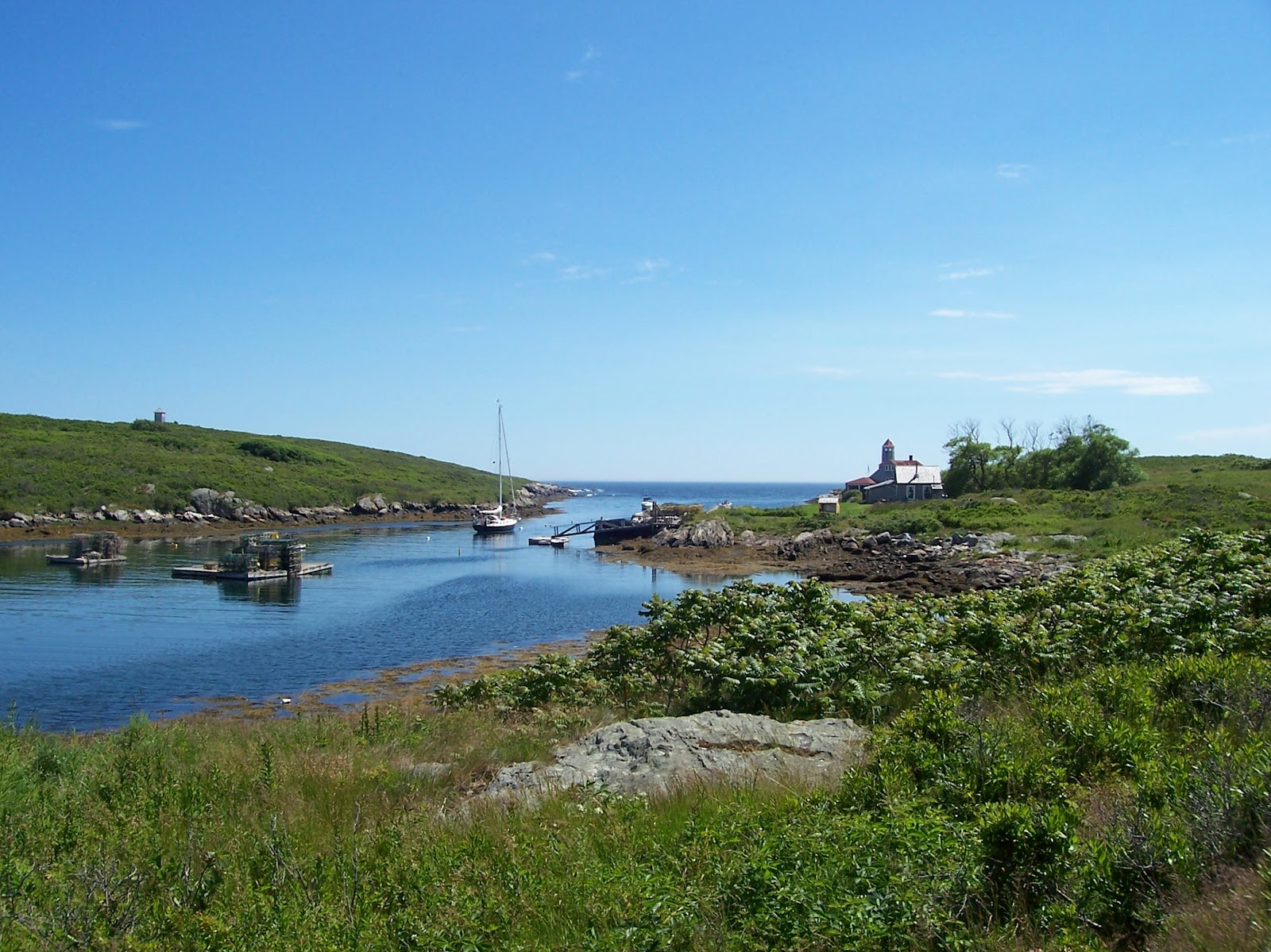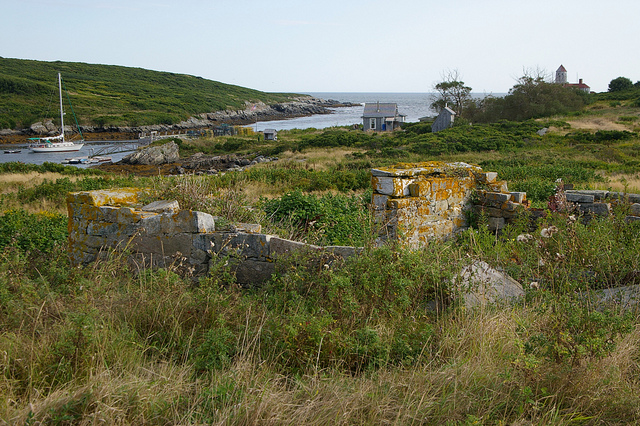This month our Round Robin Blog Hop invites us to share an excerpt from something we've written about travel or vacation.
xx
 One summer a few years ago, intrigued by the history I’d read about a tiny island off the coast of Maine, I decided to go out to explore the place. I could see the island from my home on the mainland so it was just a day sail, but still an adventure. Once upon a time, on this scrap of land a British captain had come ashore to steal sheep before moving on to harass other coastal communities in an effort to keep colonists from joining the likes of Sam Adams and John Hancock. Even before that, Pilgrims, starving in Plymouth Massachusetts had traveled north to beg for food at communities my history books had never even mentioned, but had apparently existed long before the Pilgrims arrived on the Mayflower. This island called Damariscove had once been a thriving place filled with merchants, seaman and patriots and now uninhabited by year-round residents was a lure I couldn’t resist.
One summer a few years ago, intrigued by the history I’d read about a tiny island off the coast of Maine, I decided to go out to explore the place. I could see the island from my home on the mainland so it was just a day sail, but still an adventure. Once upon a time, on this scrap of land a British captain had come ashore to steal sheep before moving on to harass other coastal communities in an effort to keep colonists from joining the likes of Sam Adams and John Hancock. Even before that, Pilgrims, starving in Plymouth Massachusetts had traveled north to beg for food at communities my history books had never even mentioned, but had apparently existed long before the Pilgrims arrived on the Mayflower. This island called Damariscove had once been a thriving place filled with merchants, seaman and patriots and now uninhabited by year-round residents was a lure I couldn’t resist.
xx
 My daughter and my dad and I sailed out there one beautiful sunny Maine summer day and wandered among the remnants of that long-ago island community and as I stood on the top of a large chunk of granite, part of an old stone foundation, it wiggled alarmingly. I jumped away, not eager to fall into the grass and daisy-lined abyss. But a writer’s mind, always wandering down unexpected alleys, finds stories in the unlikeliest of places. And so, on our sail home, the question that popped into my head was: “What if I had fallen into that hole? What if I’d hit my head and been knocked unconscious? And what if I’d woken up in a different century?” That’s how my novel, Iain’s Plaid was born. A day-trip to explore a place filled with history turned into a time-travel adventure back to 1775, the year the idea of independence was born in America.
My daughter and my dad and I sailed out there one beautiful sunny Maine summer day and wandered among the remnants of that long-ago island community and as I stood on the top of a large chunk of granite, part of an old stone foundation, it wiggled alarmingly. I jumped away, not eager to fall into the grass and daisy-lined abyss. But a writer’s mind, always wandering down unexpected alleys, finds stories in the unlikeliest of places. And so, on our sail home, the question that popped into my head was: “What if I had fallen into that hole? What if I’d hit my head and been knocked unconscious? And what if I’d woken up in a different century?” That’s how my novel, Iain’s Plaid was born. A day-trip to explore a place filled with history turned into a time-travel adventure back to 1775, the year the idea of independence was born in America.
xx
An excerpt from Iain’s Plaid:
xx
 Dani Amico sucked in a lungful of salty, sun-filled air and headed up the beach to explore this island with so much history that she’d just had to sail out here and see it for herself. Scrambling through a narrow opening in the beach roses, she gazed out over the island; nearly all of it visible from her vantage point. To her right, a small pond nestled into the narrowest part of the island, and a long stretch of land tapered off to the north, covered with scrub growth and wildflowers. To the south lay the harbor. She turned and headed in that direction.
Dani Amico sucked in a lungful of salty, sun-filled air and headed up the beach to explore this island with so much history that she’d just had to sail out here and see it for herself. Scrambling through a narrow opening in the beach roses, she gazed out over the island; nearly all of it visible from her vantage point. To her right, a small pond nestled into the narrowest part of the island, and a long stretch of land tapered off to the north, covered with scrub growth and wildflowers. To the south lay the harbor. She turned and headed in that direction.
Clusters of old cellar holes dotted the island, most of them on the high ground above the harbor. The path disappeared as she scrambled over a ledge of granite and reappeared on the other side. A small building stood in the shelter of the next outcropping of rock, the boards long since stripped of any paint they might once have had. A sign hung on the door. Dani climbed the two stairs and read:
Welcome to the Damariscove Museum. Please, come in. 
Doing just that, she chuckled. This had to be smallest museum in history. Someone had carefully arranged an assortment of artifacts on a waist-high shelf along two walls with handwritten explanations beside each one. She made her way along the exhibit. There was a brass button the unknown curator claimed had once belonged to a British soldier. Hand-blown glass fishing floats. The head of a farmer’s pick, its wooden handle long since rotted away. A few Indian arrowheads. Pieces of a handgun that dated from the 1700s. Another shelf held a collection of shells and colored sea-glass.
Suddenly an eerie feeling curled its way down her spine and made the hair on her neck stand up. Dani hurried out of the small space that now felt slightly claustrophobic.
Back out in the sunshine, the feeling left her.
That was weird!
If that headless man and his dog were to appear right about now, she might believe in ghosts after all. But the island appeared just as deserted as before.
She climbed the rest of the way to the ridge where the path reappeared again and wound away from the harbor and up toward a meadow filled with lupine. A vast stretch of purples, pinks, and blues. A field of lupine in bloom was one of the prettiest signs of the coming summer in Maine.
To Dani’s right, the outline of a foundation stretched away in two directions. It was larger than most. Maybe it had once been a barn. She stepped up onto the large square of granite that made up the cornerstone and gazed back down at the brilliant-blue stretch of water that was Damariscove Harbor.
Another shiver ran down Dani’s spine. The hair on the nape of her neck prickled. She glanced toward the little museum in case there was unexpected company, but the path was just as abandoned as the foundation she was standing on. No one is on this island . . . unless ghosts really do exist?
“Idiot,” she chided herself. “Ghosts aren’t real.” But her skin still tingled, and the uneasy chill lingered in spite of the warm sunshine.
Dani hugged her arms across her chest and checked the skyline above the invisible stony curve of beach where she’d left her boat. The top of the aluminum mast thrust skyward above the wild tangle of beach roses with its jaunty red windsock snapping in the stiffening breeze.
Maybe I shouldn’t have sailed out here alone.
Except it had been solitude she’d been seeking. Even though the phone calls urging her to accept the teaching position had ceased and Clayton’s proposal forever forestalled, she’d still needed time by herself to think about what she did want before taking a plunge that would change her life forever.
She slid down to sit on the massive old corner-stone, dangling her legs over the edge. Clayton had been a comfortable companion and an okay lover, but she hadn’t been in love with him. Getting married was supposed to be exciting, and her gut had been telling her Clayton was not the one. The immense feeling of relief that filled her once she’d told him the truth proved it.
She loved history and teaching, but accepting the job Clayton had engineered for her had seemed just another tie to him. Maybe she’d just been refusing to admit she was a grownup, but a few months away exploring new places would give her the space to do it.
Maybe next she’d try snorkeling over the Great Barrier Reef in Australia. Although a visit to Thailand to see the temples and ruins that Theresa thought were exotic would be cool to see. And she’d love seeing the place where so much history had happened. Then again, she could go to Stonehenge. Or maybe even the battlefield at Culloden, the battle that had precipitated the emigration of so many Scots to the colonies. Scots like the captain she’d been reading about.
She studied the landscape again, imagining this tiny scrap of land off the coast of Maine as it might have been more than two hundred years ago. When Patriot sea captains had swaggered down to the harbor to set out in their swift little sloops to harass the British Navy, and fishermen had salted their catches of cod along the shell-lined beach while Native Americans glided in and out of this harbor in their canoes trading furs for guns.
What might the village have looked like, huddled around the edge of the harbor? Some of the buildings that existed in Boston were that old, but the city had grown up around them, dwarfing them in importance. Here, the buildings had crumbled away to nothing, leaving only the abandoned cellar holes to show they’d ever existed at all.
If those old cellars could talk, what stories might they tell? The one she was sitting atop was bigger than most. A wide set of granite steps to her right must have led up to the main floor. Perhaps it had been a meeting hall? Or a big barn?
Abruptly and inexplicably chilled with her hair standing on end, Dani snatched her backpack off the ground and pushed herself to her feet. The lichen-covered chunk of old granite wobbled, then toppled into the hole. She yelped in surprise and tried to scramble back away from the abyss, but her foot slipped.
Tumbling downward in a rattling shower of stones and dirt, she landed, gasping for breath, in a shocked heap just inches from the gaping cavern beneath the old stairs. Her backpack thudded down on top of her.
Then the world went black.
***
Iain MacKail strode into the ink-dark alley behind his warehouse with an unaccustomed curse on his lips and a hefty belaying pin clutched in his left hand.
“Ye willna get away with it this time, ye bludy spy!”
Set deep into the thick fieldstone foundation, a stout oak door rattled insistently against the iron bolt that held it shut. Iain tightened his grip on the belaying pin, gritted his teeth, and reached out to release the door.
A dark figure exploded through the doorway and hurtled headlong into the alley with a gasp. Iain grabbed the intruder by the collar and thrust him against the wall.
Shocked by his captive’s diminutive size, Iain just barely managed to abort the blow meant to stun a much larger adversary. The scamp wriggling frantically within Iain’s grip couldn’t have been more than twelve. Thirteen at most. Maybe he’d been mistaken. Maybe this was just a matter of thievery and not another of the damnable prying turncoats spying for Malcolm.
“Put me down, you bastard!” The lad clawed ineffectually at the shirt collar pulled tight around his throat by Iain’s iron grip.
In spite of the furious stream of vulgarity, Iain heard fear in the breathless young voice. He lowered the lad to the ground with a mixture of suspicion and annoyance. What, in heaven’s name, was he to do with this unexpected interruption? With a hold full of contraband destined for Boston, he couldn’t take chances on being caught. The citizens of Boston were in desperate need, else he wouldn’t have gotten involved in the first place. But he was involved. And if this scamp was a spy, he was in trouble.
Curst chance! He needed to be aboard his ship in the next half hour, preparing to weigh anchor when the tide turned. What he didn’t need was a youthful, would-be thief to cope with, even if the intruder was not working for the British customs agent. Iain touched his breast pocket, reassuring himself that the incriminating list of goods and donors he’d shoved into it hadn’t fallen out in his rush to catch the spy. His irritation grew.
He kept his tone deceptively mild and asked, “Have ye naught to say for yerself besides blaspheming?”
“I . . . I don’t have to say anything. I haven’t done anything wrong. And you’re hurting me.” The lad wriggled in another attempt to free himself. “God damn you.”
“Aye, I expect He already has.” Iain pursed his lips ruefully.
“Let go of me!” The lad squirmed harder.
“If I do, will ye promise ye willna be scarpering off?”
The lad stuttered out something that could have been a denial. Iain dropped his hand and thrust the belaying pin into the waistband of his breeches. “Come along, then. Ye have some explaining to do.” He gave the lad a shove toward the mouth of the alley.
“Why should I go anywhere with you?” The youthful voice held a mutinous challenge.
“Because I didna give ye a choice.”
Iain prodded his reluctant prisoner up the wide granite steps and through the door. He pointed to an armless, straight-backed chair. After a brief hesitation, the lad dropped into it.
Clad in a hunting shirt several times too large for him and a pair of oddly fashioned breeches, the lad returned Iain’s probing gaze and shivered. His emerald-green eyes seemed too big for the delicate, fine-boned face, and at the moment, they held an unsettling blend of outrage, bewilderment, and fear. Iain was torn.
Wishing he could stay out of the volatile political wrangling going on in places like Boston and Virginia, Iain had been faced with a difficult choice. He felt no loyalty to a king whose father and uncle had visited devastating ruin on the land of his birth and filled his childhood with grief. But neither could he foresee any happy outcome in defying so powerful a monarchy again in spite of the persuasive arguments of men like Samuel Adams and John Hancock.
Iain had abandoned Scotland for the colonies looking for a better life. And he’d prospered. The new world was filled with opportunities for men who were willing to work for them.
But now history seemed to be repeating itself. Just like the Scots after their defeat at Culloden, the citizens of Boston were being crushed by a vengeful Parliament, and Iain was forced to take sides. Forced to wonder if innocent-seeming young boys were being paid to spy on men like himself who were just trying to help their beleaguered neighbors.
“Now then,” Iain began, carefully curbing the impatience he felt, “suppose ye begin by telling me who you are.”

Hop on over to check out other adventures, travel and vacation stories by these other fine authors:
XX
Diane Bator http://dbator.blogspot.ca/
Marie Laval http://marielaval.blogspot.co.uk/
Victoria Chatham http://www.victoriachatham.com
Judith Copek http://lynx-sis.blogspot.com/
Anne Stenhouse http://annestenhousenovelist.wordpress.com/
Helena Fairfax http://www.helenafairfax.com/blog
A.J. Maguire http://ajmaguire.wordpress.com/
Beverley Bateman http://beverleybateman.blogspot.ca/
Dr. Bob Rich https://wp.me/p3Xihq-1GK
Connie Vines http://mizging.blogspot.com/
Rhobin L Courtright http://www.rhobincourtright.com